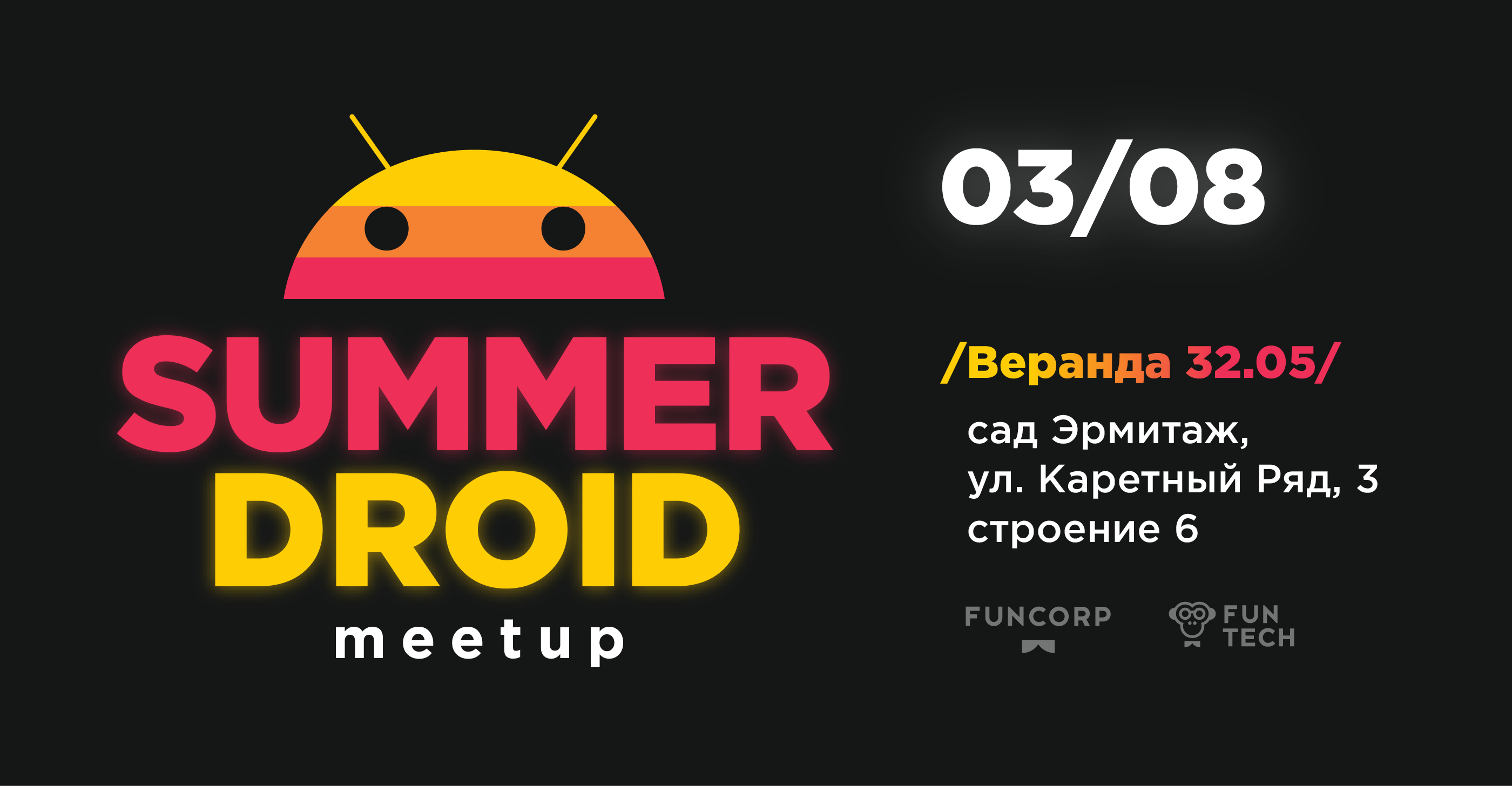Summer droid meetup

Hello! We invite Android developers to our Summer Droid Meetup . 3rd August, Hermitage Garden, Karetny Ryad, 3, bld . 6, Veranda 32.05 . Beginning at 12:00.
Mitap program
“Collecting and analyzing extraordinary data of Android applications”, Dmitry Vasiliev, FunCorp
About the report
')
Report on the analysis of technical indicators of the application.
The goal is to talk about the data collection and analysis tools for mobile applications (and not only) that we use. And also about what technical characteristics of the application need to be collected and how to analyze them.
Let's talk about:
- How and where do we collect data on iFunny
- What technical data to collect
- How and where to analyze them
Coroutines Flow, Cyril Rozov, Epam
About the report
In my report, I will talk about:
- hot channel
- cold flow
- How to work with Flow
- Flow Architecture
- Future Channel and the role of Flow
“Build Android apps. Task with an asterisk ”, Anton Potapov, FunCorp
About the report
In my report, I want to talk about how to build an Android application without using Gradle.
The report is divided into the following parts:
- .apk. It all started with him. Here I will talk about the structure of a packed Android application using an example.
- About the console. I'll tell you about what tools are used to build an Android project under the hood of Gradle, and how to use them to build HelloWorld from the console
- Buck. Facebook
- Bazel. Google
- Jerkar. Java for Java. I'll tell you about what problems they were created to solve and, of course, we will assemble HelloWorld with each system.
- As a conclusion, compare the measurements from points 3-6 with Gradle
"Code generation without kapt", Mikhail Rozumyansky, Joom
About the report
A few years ago we started working with bytecode, generating and modifying it at compile time, since APT for Kotlin was not supported. After the appearance of kapt, we added it to our project in order to use databinding, and as a result we encountered a lot of problems: long builds, strange compilation errors, memory leaks. It quickly became clear that it was better not to get in touch with APT, so we continued to develop our projects working with bytecode. And not so long ago, we managed to run DataBinding without kapt and, thus, completely got rid of kapt in the project. In this report we will talk about how to live without kapt, what tasks can be solved at the bytecode level, and also consider the pros and cons of different approaches to code generation.
“Model Driven Configuration of an Application on Kotlin DSL”, Andrey Govorovsky, Mail.ru Group
About the report
It is hard to imagine a modern mobile application without remote configuration - A / B tests, launch of new features, replacement of strings, graphic resources.
In the course of the report, we will look at how we created DSL on Kotlin in Mail Mail.ru application to describe the application configuration, how we generated parsers with validation to reduce the boilerplate code, documentation for A / B tests, developer settings for testers from it. and how it's all built into the build process.
Why is it all needed? Since we are carrying out many A / B tests, we needed a single source of feature information in a particular version of the application.
I'll tell you how we wrote a simple Kotlin DSL to describe the application configuration model.
How then from this DSL we generate models / parsers / dock / developer settings (to change the configuration on the fly) and embed it in the application.
How dock is used for remote configuration (in the dock, json examples for features are generated that can be sent to the application).
I'll tell you how to embed all this into the build process via gradle task and make it incremental (@InputFile, @OutputDirectory).
Apply for participation here .
More information in our Telegram channel .
For communication with the organizers, speakers and other participants works Telegram-chat .
For those who will not be able to attend, there will be an online broadcast on our Youtube channel .
Source: https://habr.com/ru/post/458888/
All Articles